Unit 7 Topic2 Topic 2 I’m not sure whether I can cook it well. Section D课件(共24张PPT) 2023-2024学年仁爱
文档属性
| 名称 | Unit 7 Topic2 Topic 2 I’m not sure whether I can cook it well. Section D课件(共24张PPT) 2023-2024学年仁爱 |  | |
| 格式 | pptx | ||
| 文件大小 | 3.6MB | ||
| 资源类型 | 教案 | ||
| 版本资源 | 仁爱科普版 | ||
| 科目 | 英语 | ||
| 更新时间 | 2024-05-10 14:43:13 | ||
图片预览

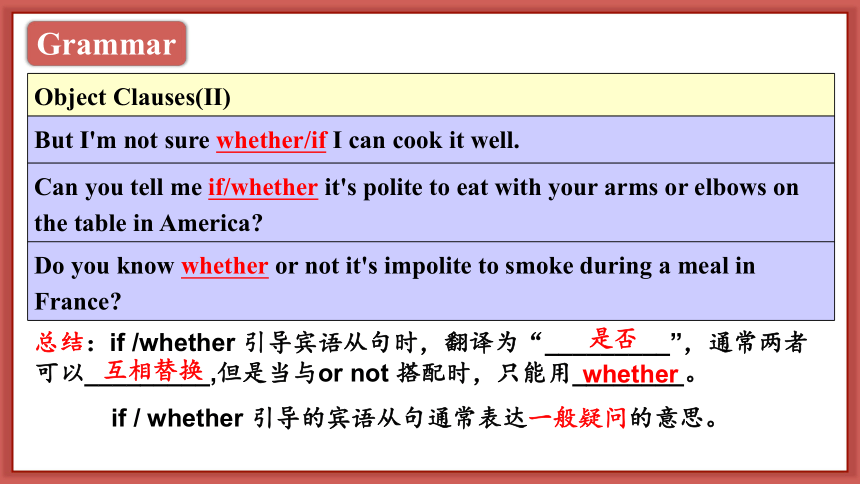
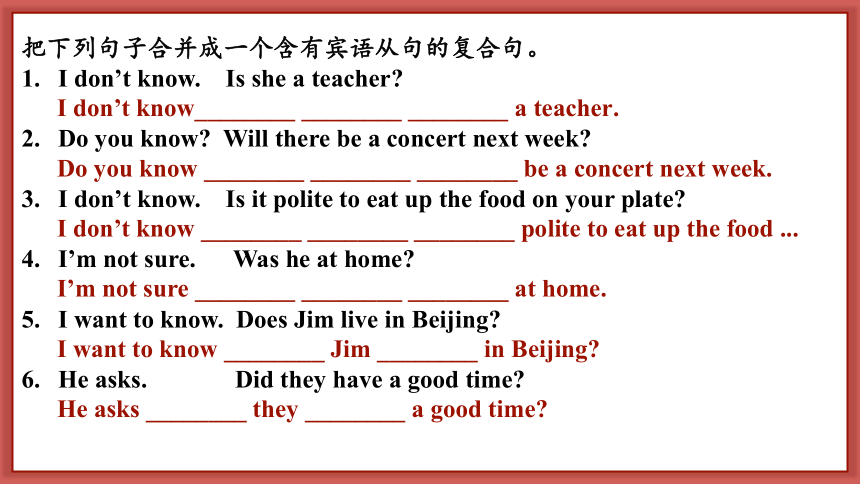
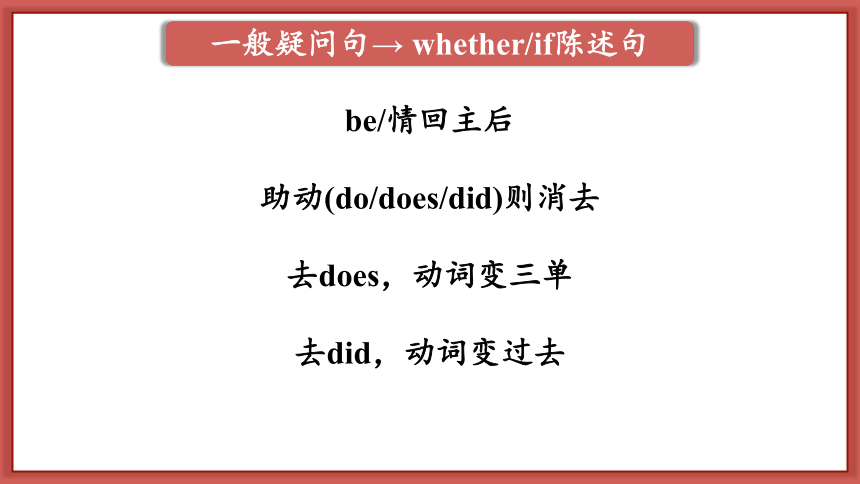

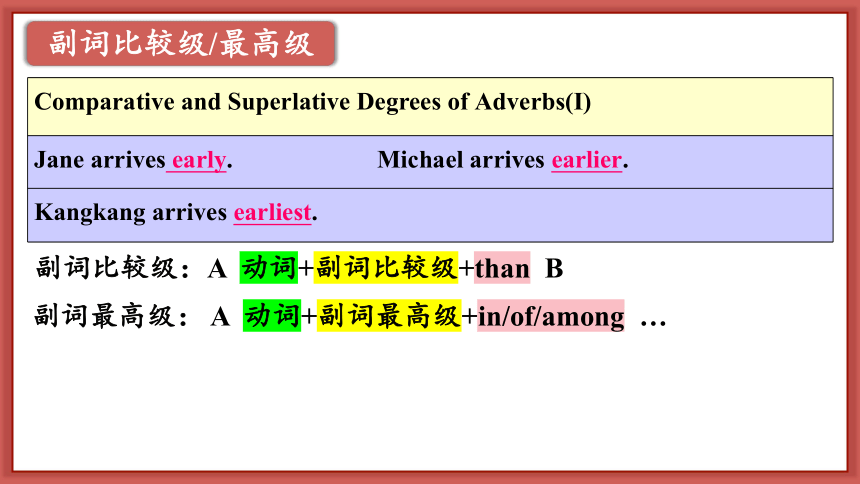
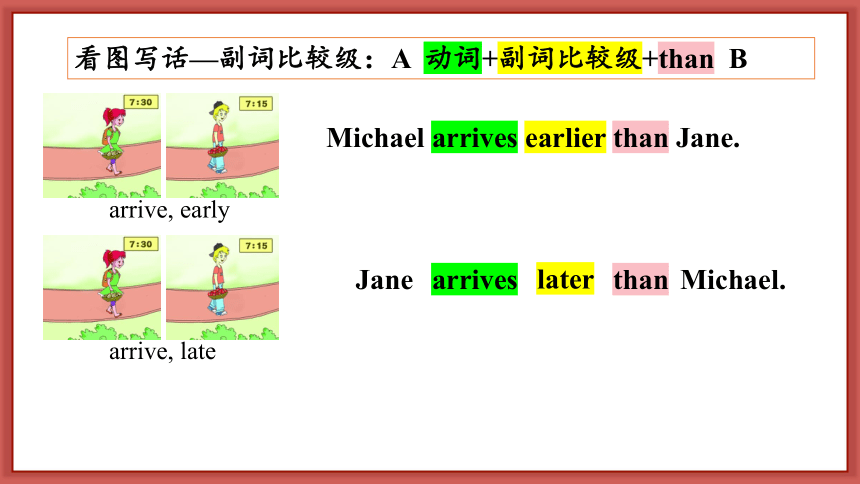
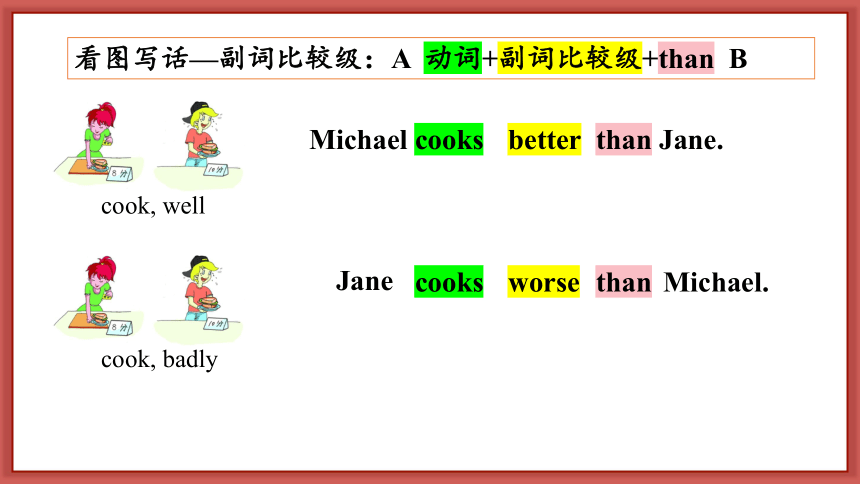
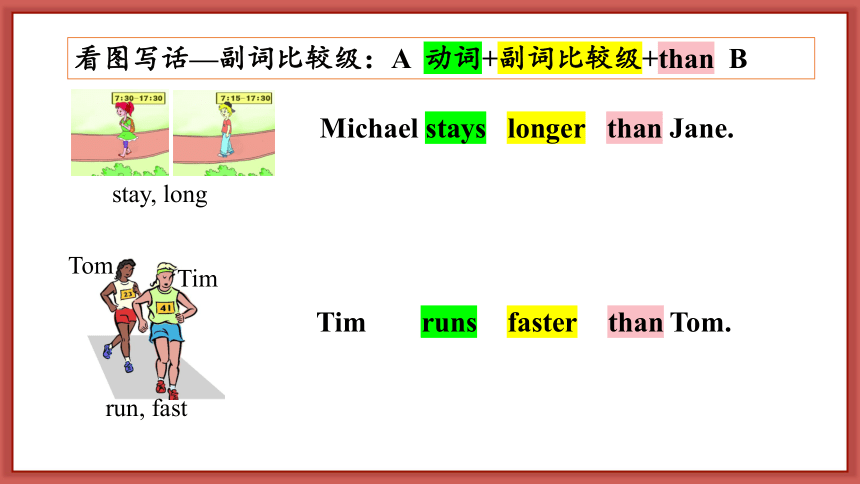
文档简介
(共24张PPT)
SECTION D
Topic 2
I’m not sure whether
I can cook it well.
Unit 7
Food Festival
Grammar
Object Clauses(Ⅱ)
But I'm not sure whether/if I can cook it well.
Can you tell me if/whether it's polite to eat with your arms or elbows on the table in America
Do you know whether or not it's impolite to smoke during a meal in France
总结:if /whether 引导宾语从句时,翻译为“_________”,通常两者可以_________,但是当与or not 搭配时,只能用________。
if / whether 引导的宾语从句通常表达一般疑问的意思。
是否
互相替换
whether
把下列句子合并成一个含有宾语从句的复合句。
I don’t know. Is she a teacher
Do you know Will there be a concert next week
I don’t know. Is it polite to eat up the food on your plate
I’m not sure. Was he at home
I want to know. Does Jim live in Beijing
He asks. Did they have a good time
I don’t know________ ________ ________ a teacher.
Do you know ________ ________ ________ be a concert next week.
I don’t know ________ ________ ________ polite to eat up the food ...
I’m not sure ________ ________ ________ at home.
I want to know ________ Jim ________ in Beijing
He asks ________ they ________ a good time
be/情回主后
助动(do/does/did)则消去
去does,动词变三单
去did,动词变过去
一般疑问句→ whether/if陈述句
I don’t know. Is she a teacher
Do you know Will there be a concert next week
I don’t know. Is it polite to eat up the food on your plate
I’m not sure. Was he at home
I want to know. Does Jim live in Beijing
He asks. Did they have a good time
I don’t know________ ________ ________ a teacher.
Do you know ________ ________ ________ be a concert next week.
I don’t know ________ ________ ________ polite to eat up the food ...
I’m not sure ________ ________ ________ at home.
I want to know ___________ Jim ________ in Beijing
He asks ___________ they ________ a good time
if/whether she is
if/whether there will
if/whether it is
if/whether he was
if/whether
lives
if/whether
had
Comparative and Superlative Degrees of Adverbs(Ⅰ)
Jane arrives early. Michael arrives earlier.
Kangkang arrives earliest.
副词比较级/最高级
副词比较级:A 动词+副词比较级+than B
副词最高级: A 动词+副词最高级+in/of/among …
看图写话—副词比较级:A 动词+副词比较级+than B
Michael
arrives
earlier
than
Jane.
arrive, early
arrive, late
Jane
arrives
later
than
Michael.
cook, well
Michael
cooks
better
than
Jane.
cook, badly
Jane
cooks
worse
than
Michael.
看图写话—副词比较级:A 动词+副词比较级+than B
Michael
stays
longer
than
Jane.
stay, long
run, fast
Tom
Tim
Tim
runs
faster
than
Tom.
看图写话—副词比较级:A 动词+副词比较级+than B
看图写话——副词最高级: A 动词+副词最高级+in/of/among
arrive, early
Kangkang
arrives
earliest
of
the three.
arrive, late
Jane
arrives
latest
of
the three.
Tom
run, fast, of
Tom
runs
fastest
of
all.
sing, well, among
Jane
Jane
sings
best
among
the children.
看图写话——副词最高级: A 动词+副词最高级+in/of/among
Do you know the eating habits in different countries
In China
talk loudly at table
pick up your bowl
In Japan
make noise while eating
lick your chopsticks
In America
speak quietly and smile a lot
smoke at table
I think (that) it is polite to … in China.
I think (that) it is impolite to … in China.
Area Eating habits
North America / Australia / Europe
China
Parts of India
Thailand
Korea
There are two or more courses for every meal and people use knives and forks to eat.
All Chinese people use chopsticks to eat.
People use their fingers to pick up the food.
People use spoons or chopsticks to eat, but it is not polite to use both of them at the same time.
People eat with a spoon and a fork and they don't use knives at all.
Fill in the table according to 1a.
around the world
all over the world
eating habits
two or more courses
in the southern part of
be far away from
pick up
whether or not
eat with
both of them
at the same time
Eating Habits
People around the world have different eating habits.
In North America, Australia and Europe, there are two or more courses for every meal and people use knives and forks to eat.
=all over the world全世界
饮食习惯
北美
菜=dishes
use sth to do sth
用某物做某事
In the southern part of China, people eat rice a lot, while in the north people often eat noodles. In the central and western parts, people are far away from the sea, so they don’t eat much seafood. But all Chinese people use chopsticks to eat.
在…的南部
经常
然而
在北方
在中部和西部
be far away from 远离
In parts of India, people use their fingers to pick up the food.
In Thailand,people eat with a spoon and a fork and they don't use knives at all.
In Korea, people use spoons or chopsticks to eat, but it is not polite to use both of them at the same time.
在…部分地区
抓起食物
用…吃
=it’s impolite to do
做某事不礼貌
两者都
同时
First ... Second ... Next ... Then ... After that ... Finally ...
Well done!
Would you mind if we learn to make it from you
Of course not.
Remember not to drink too much.
Functions
Chicken soup is very delicious,
3
Look at the pictures and write a passage about how to cook chicken soup.
cut up
wash
put...into
boil
add salt,
green onions
be ready,
enjoy
and it’s good for our health.
Now let’s cook it together.
First, cut up chicken.
Next, wash the chicken .
Then, put it into a deep pot 70% -80% full of water.
After that, boil the chicken for about 2 hours.
Finally, add some salt, green onions and so on.
Now the chicken soup is ready and you can enjoy it.
C
是否
主现从随便
如果
主将从现
B
是否
如果
A
B
+不可数n.
动词+too much
+adj./adv.
C
A
A is 数字+单位 away from B
C
最高级
比较级
B
是否
一般将来
如果
主将从现
spoon
chopsticks
fingers
southern
eating
风味美食
THANK
YOU
SECTION D
Topic 2
I’m not sure whether
I can cook it well.
Unit 7
Food Festival
Grammar
Object Clauses(Ⅱ)
But I'm not sure whether/if I can cook it well.
Can you tell me if/whether it's polite to eat with your arms or elbows on the table in America
Do you know whether or not it's impolite to smoke during a meal in France
总结:if /whether 引导宾语从句时,翻译为“_________”,通常两者可以_________,但是当与or not 搭配时,只能用________。
if / whether 引导的宾语从句通常表达一般疑问的意思。
是否
互相替换
whether
把下列句子合并成一个含有宾语从句的复合句。
I don’t know. Is she a teacher
Do you know Will there be a concert next week
I don’t know. Is it polite to eat up the food on your plate
I’m not sure. Was he at home
I want to know. Does Jim live in Beijing
He asks. Did they have a good time
I don’t know________ ________ ________ a teacher.
Do you know ________ ________ ________ be a concert next week.
I don’t know ________ ________ ________ polite to eat up the food ...
I’m not sure ________ ________ ________ at home.
I want to know ________ Jim ________ in Beijing
He asks ________ they ________ a good time
be/情回主后
助动(do/does/did)则消去
去does,动词变三单
去did,动词变过去
一般疑问句→ whether/if陈述句
I don’t know. Is she a teacher
Do you know Will there be a concert next week
I don’t know. Is it polite to eat up the food on your plate
I’m not sure. Was he at home
I want to know. Does Jim live in Beijing
He asks. Did they have a good time
I don’t know________ ________ ________ a teacher.
Do you know ________ ________ ________ be a concert next week.
I don’t know ________ ________ ________ polite to eat up the food ...
I’m not sure ________ ________ ________ at home.
I want to know ___________ Jim ________ in Beijing
He asks ___________ they ________ a good time
if/whether she is
if/whether there will
if/whether it is
if/whether he was
if/whether
lives
if/whether
had
Comparative and Superlative Degrees of Adverbs(Ⅰ)
Jane arrives early. Michael arrives earlier.
Kangkang arrives earliest.
副词比较级/最高级
副词比较级:A 动词+副词比较级+than B
副词最高级: A 动词+副词最高级+in/of/among …
看图写话—副词比较级:A 动词+副词比较级+than B
Michael
arrives
earlier
than
Jane.
arrive, early
arrive, late
Jane
arrives
later
than
Michael.
cook, well
Michael
cooks
better
than
Jane.
cook, badly
Jane
cooks
worse
than
Michael.
看图写话—副词比较级:A 动词+副词比较级+than B
Michael
stays
longer
than
Jane.
stay, long
run, fast
Tom
Tim
Tim
runs
faster
than
Tom.
看图写话—副词比较级:A 动词+副词比较级+than B
看图写话——副词最高级: A 动词+副词最高级+in/of/among
arrive, early
Kangkang
arrives
earliest
of
the three.
arrive, late
Jane
arrives
latest
of
the three.
Tom
run, fast, of
Tom
runs
fastest
of
all.
sing, well, among
Jane
Jane
sings
best
among
the children.
看图写话——副词最高级: A 动词+副词最高级+in/of/among
Do you know the eating habits in different countries
In China
talk loudly at table
pick up your bowl
In Japan
make noise while eating
lick your chopsticks
In America
speak quietly and smile a lot
smoke at table
I think (that) it is polite to … in China.
I think (that) it is impolite to … in China.
Area Eating habits
North America / Australia / Europe
China
Parts of India
Thailand
Korea
There are two or more courses for every meal and people use knives and forks to eat.
All Chinese people use chopsticks to eat.
People use their fingers to pick up the food.
People use spoons or chopsticks to eat, but it is not polite to use both of them at the same time.
People eat with a spoon and a fork and they don't use knives at all.
Fill in the table according to 1a.
around the world
all over the world
eating habits
two or more courses
in the southern part of
be far away from
pick up
whether or not
eat with
both of them
at the same time
Eating Habits
People around the world have different eating habits.
In North America, Australia and Europe, there are two or more courses for every meal and people use knives and forks to eat.
=all over the world全世界
饮食习惯
北美
菜=dishes
use sth to do sth
用某物做某事
In the southern part of China, people eat rice a lot, while in the north people often eat noodles. In the central and western parts, people are far away from the sea, so they don’t eat much seafood. But all Chinese people use chopsticks to eat.
在…的南部
经常
然而
在北方
在中部和西部
be far away from 远离
In parts of India, people use their fingers to pick up the food.
In Thailand,people eat with a spoon and a fork and they don't use knives at all.
In Korea, people use spoons or chopsticks to eat, but it is not polite to use both of them at the same time.
在…部分地区
抓起食物
用…吃
=it’s impolite to do
做某事不礼貌
两者都
同时
First ... Second ... Next ... Then ... After that ... Finally ...
Well done!
Would you mind if we learn to make it from you
Of course not.
Remember not to drink too much.
Functions
Chicken soup is very delicious,
3
Look at the pictures and write a passage about how to cook chicken soup.
cut up
wash
put...into
boil
add salt,
green onions
be ready,
enjoy
and it’s good for our health.
Now let’s cook it together.
First, cut up chicken.
Next, wash the chicken .
Then, put it into a deep pot 70% -80% full of water.
After that, boil the chicken for about 2 hours.
Finally, add some salt, green onions and so on.
Now the chicken soup is ready and you can enjoy it.
C
是否
主现从随便
如果
主将从现
B
是否
如果
A
B
+不可数n.
动词+too much
+adj./adv.
C
A
A is 数字+单位 away from B
C
最高级
比较级
B
是否
一般将来
如果
主将从现
spoon
chopsticks
fingers
southern
eating
风味美食
THANK
YOU
同课章节目录
- Unit 5 Feeling excited
- Topic 1 You look excited
- Topic 2 I’m feeling better now.
- Topic 3 Many things can affect our feelings.
- Unit 6 Enjoying Cycling
- Topic 1 We're going on a three-day visit to Mount
- Topic 2 How about exploring Tian’anmen Square?
- Topic 3 Bicycle riding is good exercise.
- Unit 7 Food festival
- Topic 1 We’re preparing for a food festival.
- Topic 2 I’m not sure whether I can cook it well.
- Topic 3 I Cooked the Most Successfully
- Unit 8 Our Clothes
- Topic 1 We will have a class fashion show.
- Topic 2 We can design our own uniforms.
- Topic 3 He said the fashion show was wonderful.
